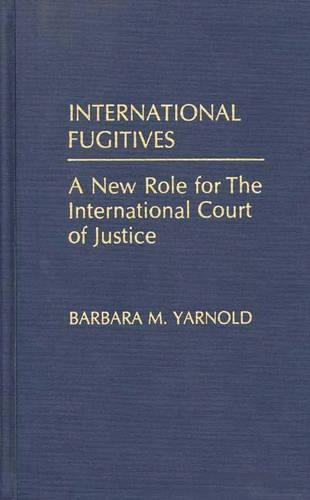
International Fugitives: A New Role for the International Court of Justice
(Hardback)
Publishing Details
International Fugitives: A New Role for the International Court of Justice
By (Author) Barbara M. Yarnold
Bloomsbury Publishing PLC
Praeger Publishers Inc
25th March 1991
United States
Classifications
Tertiary Education
Non Fiction
341.488
Physical Properties
Hardback
168
Description
In this penetrating analysis of international extradition practices, Barbara Yarnold argues that, as they currently exist, these practices are not functioning adequately. This breakdown is confirmed, she demonstrates, by repeated incidents of illegal international extradition, most recently the 1989 gunboat extradition of Panama's General Noriega by the United States. Yarnold contends that the inability of current extradition procedures to fulfill the needs of the parties involved poses a serious threat to world peace and security because the extra-legal extraditions that are substituted often involve the violation of the territorial sovereignty of another state. Yarnold proposes an alternative mechanism for dealing with requests for international extradition in which the International Court of Justice plays a central role. Divided into three parts, the book begins with a group of chapters that examine and evaluate contemporary extradition practices. The author looks at the history of extradition agreements, analyzes the international extradition proceedings of U.S. district courts during the last sixty years, and shows that the inherent uncertainty and delay in international extradition practices often leads frustrated states to resort to extra-legal or illegal alternatives. In Part II, Yarnold examines efforts that have been made toward resolving international disputes through negotiation rather than through the use of force, focusing particular attention on the development of the International Court of Justice. Finally, the author suggests that the world community of states grant to the International Court of Justice jurisdiction over both international crimes and crimes committed against states but involve the flight of the fugitive from one state to another. She suggests further that the decision regarding whether or not international extradition of a fugitive is warranted should also be made by the International Court of Justice, instead of by courts within states, which are subject to local biases. Students of international relations and international law will find Yarnold's work illuminating reading.
Reviews
This book should be read by those interested in keeping alive the possibility of a new world order; its bibliography alone recommends it. The truth uncovered through such studies and the practices of the coming generation will determine the reality on which Yarnold bases her hope.-Perspectives on Political Science
Yarnold, a political scientist and an attorney, is concerned about the increasing illegal international extradition of criminals. The exclusion of criminals from the extradition process because of "political questions" has led many states--including the US--to engage in the "irregular rendition" of sought fugitives. The author argues that this by-passing of international norms and standards has reduced the quality and character of national sovereignty. The analysis is broken down into three parts. The volume starts with a history of international extradition with examples that include the Adolf Eichmann and Manuel Noriega cases. Yarnold then describes the International Court of Justice, the core of her thesis. She suggests that this court become an international forum for international criminal issues. The last section delves into the potential procedure for the international court to deal with extraditable issues....The proposal does deserve a reading and study by those interested in international law and relations. Upper-division undergraduates and above.-Choice
"This book should be read by those interested in keeping alive the possibility of a new world order; its bibliography alone recommends it. The truth uncovered through such studies and the practices of the coming generation will determine the reality on which Yarnold bases her hope."-Perspectives on Political Science
"Yarnold, a political scientist and an attorney, is concerned about the increasing illegal international extradition of criminals. The exclusion of criminals from the extradition process because of "political questions" has led many states--including the US--to engage in the "irregular rendition" of sought fugitives. The author argues that this by-passing of international norms and standards has reduced the quality and character of national sovereignty. The analysis is broken down into three parts. The volume starts with a history of international extradition with examples that include the Adolf Eichmann and Manuel Noriega cases. Yarnold then describes the International Court of Justice, the core of her thesis. She suggests that this court become an international forum for international criminal issues. The last section delves into the potential procedure for the international court to deal with extraditable issues....The proposal does deserve a reading and study by those interested in international law and relations. Upper-division undergraduates and above."-Choice
Author Bio
BARBARA M. YARNOLD is an Assistant Professor in the Department of Public Administration at Florida International University. She is the author of Refugees Without Refuge and has written articles for Policy Studies Review and American Politics Quarterly.
